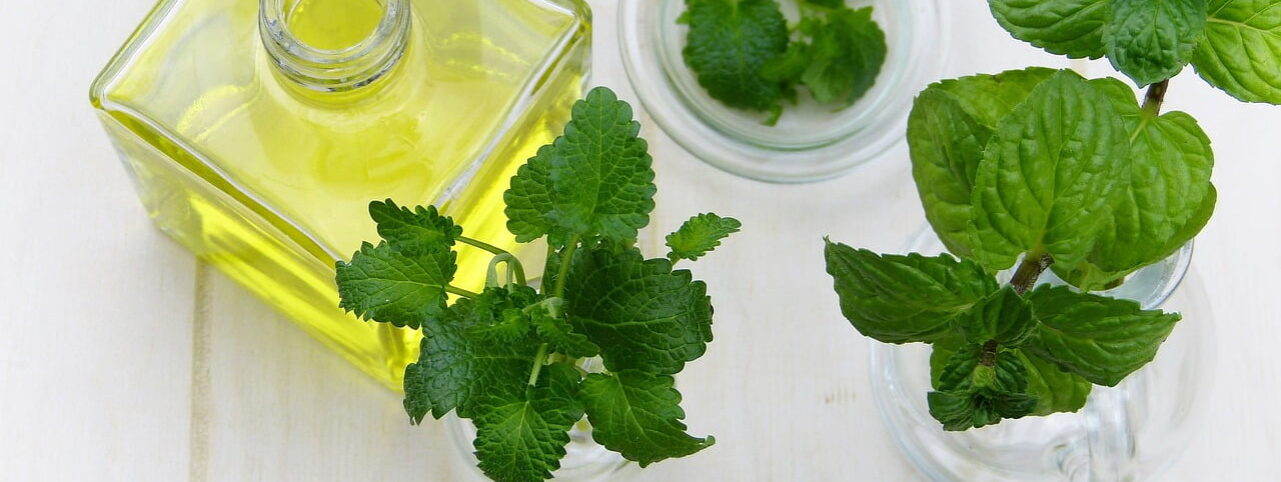Error: Contact form not found.

Extracted from the peppermint plant, peppermint oil has been used for centuries to treat a wide range of health conditions, including digestive conditions, colds, headaches, etc. In this blog post, we will be exploring some peppermint uses and benefits so that you have a better understanding of peppermint oil by the end of this post. So, read on!
Peppermint is an aromatic plant in the mint family, which is a hybrid of spearmint and watermint. It is found naturally in North America and Europe. Peppermint oil is the oil extracted from the leaves of this peppermint plant.
The oil has a distinctly sharp scent and tastes cool and refreshing just like the herb it is extracted from. Although peppermint essential oil contains more than 40 different compounds, menthol and menthone are the main chemical components in the oil. It is a common essential oil in the essential oil industry that comes in many forms, such as:
Peppermint was first introduced as a medicinal herb in 1000 BC. The popularity of the oil in aromatherapy, cosmetics and for treating certain issues has continued to grow ever since. Today, peppermint essential oil is known for its diverse benefits and versatile uses. Below are the top benefits of peppermint essential oil:
Since it has high menthol content and soothing properties, it can promote hair growth. The oil enhances the blood flow in the scalp and supports improved circulation, which eventually leads to healthier hair growth and a hydrated and flake-free scalp. It makes peppermint essential oil an excellent natural remedy for dandruff and hair thinning.
In addition to hair care, peppermint essential oil is also an effective painkiller and muscle relaxant. Its cooling and relaxing properties offer relief from different types of pain, including general discomfort, migraines and stress-related headaches.
Moreover, the menthol content in the oil can help soothe aching muscles and alleviate pain. Peppermint oil can reduce swelling and inflammation in wounds and injuries and promote fast healing when applied topically. These factors make it a valuable addition to pain relief routines.
Related: Top 5 Essential Oils That Helps Relieve Pain
Another crucial benefit of peppermint oil is in terms of respiratory health. The oil helps clear sinuses, relieve congestion and treat cold-related headaches as it contains aromatic compounds that open up nasal passages and make breathing easy.
The oil is also beneficial for treating itching and skin irritations caused by bug bites, hives, poison ivy and even conditions related to diabetes and liver or kidney issues. Simply put, peppermint oil’s anti-inflammatory properties help soothe and calm irritated skin.
Related: 5 Best Essential Oils for Relieving Skin Rashes, Itching & Hives
Peppermint oil helps regulate oil production on the skin and scalp. It ultimately results in a clean complexion and reduced acne. The oil’s benefits extend to mental well-being, with the oil known to help with anxiety, improve memory and concentration and promote relaxation.
The refreshing and cooling effects of peppermint oil not only rejuvenate the skin but also offer therapeutic relief from nausea.
In a nutshell, peppermint essential oil enhances overall well-being and is a versatile and valuable addition to both personal care routines and therapeutic practices.
Also Read: Lavender Oil Benefits: Enhancing Skincare and Well-being with Sivaroma’s Premium Oils
Now that we have reached the end of this blog, it is safe to say that peppermint essential oil is a versatile and powerful natural remedy with a wide range of benefits. From promoting hair growth to alleviating pain and improving respiratory health, the oil can be used in a wide range of applications.
However, it is essential to use the oil safely by diluting it appropriately and not using it on sensitive areas. Always consult a healthcare professional before oral use and ensure you purchase pure and high-quality oil from the best essential oils manufacturer, such as Sivaroma.
Frequently Asked Questions (FAQs)
Ans. Peppermint oil is widely used in aromatherapy. Direct application on the skin after diluting with a carrier oil and inhaling the oil using steam or a diffuser are also popular ways to use peppermint essential oil. Many food and beverage products contain peppermint extract in small amounts as it adds flavor to them.
But one thing to note here is that since pure peppermint is highly concentrated, it is not safe to take orally, and high doses of the oil can be toxic. Therefore, one should always consult a doctor before using peppermint oil orally.
Ans. Peppermint oil and extract are very different from each other. If we talk about peppermint oil, it is a highly volatile aromatic compound carefully extracted using steam distillation. On the other hand, peppermint extract is usually made by steeping peppermint in alcohol for a certain amount of time.
It means only alcohol-soluble compounds (flavor and color compounds) constitute the peppermint extract. So, although peppermint extract tastes and smells like real peppermint, it does not contain all the volatile compounds that make peppermint oil so effective and beneficial.
Ans. Here are some things to know before using peppermint essential oil for its numerous health, skin and hair benefits: